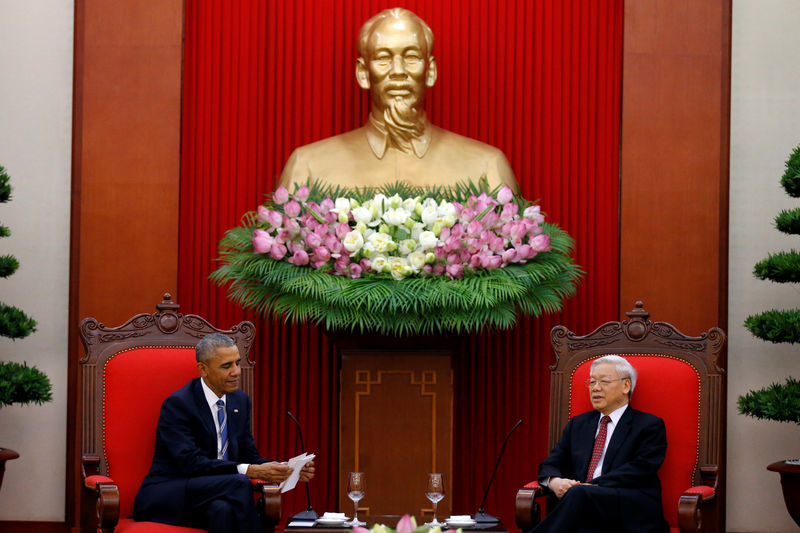By Matt Spetalnick
HANOI (Reuters) - The United States announced a complete end to its arms embargo on Vietnam on Monday, a historic step that draws a line under the two countries' earlier enmity and underscores their shared concerns about China's growing military clout.
The move came during President Barack Obama's first visit to Hanoi, which his hosts described as the arrival of a warm spring and a new chapter in relations between two countries that were at war four decades ago.
Obama, the third U.S. president to visit Vietnam since diplomatic relations were restored in 1995, has made a strategic "rebalance" toward Asia a centerpiece of his foreign policy.
Vietnam, which borders China, is a key part of that strategy amid worries about Beijing's assertiveness and sovereignty claims to 80 percent of the South China Sea.
The decision to lift the arms trade ban suggested such concerns outweighed arguments that Vietnam had not done enough to improve its human rights record and Washington would lose leverage for reforms.
Obama told a joint news conference with Vietnamese President Tran Dai Quang that disputes in the South China Sea should be resolved peacefully and not by whoever "throws their weight around." But he insisted the arms embargo shift was not linked to China.
"The decision to lift the ban was not based on China or any other considerations. It was based on our desire to complete what has been a lengthy process of moving towards normalization with Vietnam," he said. Obama later added his visit to a former foe showed "hearts can change and peace is possible."
In 2014, the Obama administration eased the decades-old arms embargo to allow its former Cold War enemy to buy maritime surveillance and "security-related" systems to strengthen it with China in mind.
Now Hanoi will be able to buy a full range of U.S. weapons and military equipment. Immediate big-ticket purchases are not expected, but Vietnam's military strategists are likely to seek U.S. drones, radar, coastal patrol boats and possibly P-3 Orion surveillance aircraft.
The sale of arms, Obama said, would depend on Vietnam's human rights commitments, and be made on a case-by-case basis.
The announcement met a mixed reception in the U.S. Congress, which can block foreign arms sales. Some lawmakers said they supported lifting the embargo, but would keep a close eye on Vietnam's human rights record.
"Congress will work with the administration to ensure today's more expansive shift in policy aligns with U.S. interests, including the desire for progress on human rights," said Republican Senator Bob Corker, chairman of the Senate Foreign Relations Committee.
But others, including some of Obama's fellow Democrats, saw a missed opportunity. "Now what incentive is left for the Vietnamese government to meaningfully enact human rights reforms and respect the civil rights of the Vietnamese people?" asked U.S. Representative Loretta Sanchez, a California Democrat who co-chairs the Congressional Caucus on Vietnam.
HUMAN RIGHTS CONCERNS
The advocacy group Human Rights Watch reacted with dismay to Washington's decision to toss away a critical lever it might have had to spur political reform in the Communist Party-ruled state.
Phil Robertson, the watchdog's Asia director, said in a statement that even as Obama was lifting the embargo, Vietnamese authorities were arresting a journalist, human rights activists and bloggers.
"In one fell swoop, President Obama has jettisoned what remained of U.S. leverage to improve human rights in Vietnam - and basically gotten nothing for it," he said.
Obama told the news conference with President Quang that Washington would continue to speak out for human rights, including citizens' right to organize through civil society.
Obama is scheduled to meet with activists on Tuesday.
Quang, who announced the lifting of the U.S. embargo before Obama could do so, was until recently minister of public security, which activists say harasses and arrests dissidents.
Dissent was once the domain of just a few in Vietnam. But while the party has allowed more open criticism in recent years, it is quick to slap down challenges to its monopoly on power.
Although the communist parties that run China and Vietnam officially have brotherly ties, China's brinkmanship over the South China Sea - where it has been turning remote outcrops into islands with runways and harbors - has forced Vietnam to recalibrate its defense strategy.
Carl Thayer, an expert on Vietnam's military at Australia's Defence Force Academy, said the steep costs of U.S. arms would remain a factor for Hanoi, pushing it toward its traditional suppliers of missiles and planes, particularly long-time security patron, Russia. On the other hand, lifting the embargo will provide Vietnam with leverage in future arms deals with those suppliers.
China sees U.S. support for rival South China Sea claimants Vietnam and the Philippines as interference and an attempt to establish hegemony in the region. Washington insists its priority is ensuring freedom of navigation and flight.
However, China's response to the embargo announcement was muted. The Foreign Ministry said it hoped the development in relations between the United States and Vietnam would be conducive to regional peace and stability.
Underlining the burgeoning commercial relationship between the United States and Vietnam, one of the first deals signed on Obama's trip was an $11.3 billion order for 100 Boeing (NYSE:BA) Co planes by low-cost airline VietJet.

China is Vietnam's biggest trade partner and source of imports. But bilateral trade with the United States has swelled ten-fold over the past two decades to about $45 billion. Vietnam is also now Southeast Asia's biggest exporter to America.